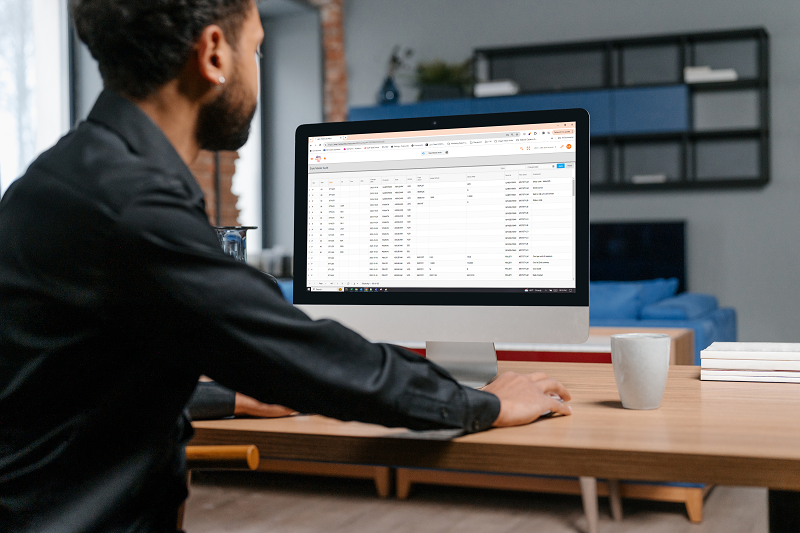Apparel ERP Software and QuickBooks: They Are Not The Same
Enterprise resource planning (ERP) and QuickBooks are two software solutions that apparel and footwear businesses use to manage their financial and operational needs. While both solutions offer benefits to businesses, they differ significantly in their capabilities and functionality.
Basic accounting functions including invoicing, accounts payable and receivable, payroll, and financial reporting are all handled by QuickBooks. It is mainly employed by small firms and lacks the functionality to manage intricate business processes. Contrarily, apparel ERP software is made to handle intricate various business functions including inventory management, production, importing, and manufacturing. Many apparel ERP solutions also include an accounting module. Large businesses employ enterprise resource planning (ERP), which can be tailored to meet their unique demands.
Let's Take a Look at QuickBooks vs ERP Systems
ERP (enterprise resource planning) and QuickBooks are both business software solutions, but they serve different purposes. ERP systems are designed to integrate all aspects of a business, from accounting and finance to manufacturing and sales, while QuickBooks is primarily accounting software.
ERP software is typically more expensive than QuickBooks enterprise, but they offer a wider range of features and functionality. QuickBooks is a basic accounting system and a good option for small businesses with simpler needs, while ERP solutions are better suited for larger businesses to handle complex business operations.
ERP System:
- An integrated management system that handles most aspects of an enterprise's operations.
- Designed to handle small to large organizations with complex operations.
- Offers more flexibility and customization options.
- Can be tailored to meet the unique needs of different organizations.
- Often has a modular architecture, allowing businesses to add or remove functionality as needed.
- More robust and complex.
QuickBooks:
- Financial management software designed for small and medium-sized businesses.
- Designed to handle financial operations only.
- Offers limited customization options.
- Can be customized through add-ons and plugins, but they are often designed to work within the framework of the QuickBooks system rather than fundamentally changing it.
- Easy to use and off-the-shelf solution.
- Affordable (yet limited) and less complex.
Financial Management
QuickBooks is primarily designed for financial management, including invoicing, accounts payable and receivable, and financial reporting. It offers basic accounting functionality, but it does not have the depth of financial management features that an ERP system often provides. An ERP system provides a comprehensive financial management system that includes features such as general ledger, accounts payable and receivable, cash management, and financial reporting.
Accounting Software
QuickBooks is an accounting software solution that is designed to help businesses manage their financial operations. It includes features such as invoicing, accounts payable and receivable, payroll, and financial reporting. This is typically a subset of what a full Fashion ERP solution can provide.
Supply Chain Management
One of the key features of ERP systems is its ability to manage the supply chain. ERP software provides a comprehensive integrated system that includes features such as procurement, inventory management, and order management. It allows businesses to track inventory levels, manage orders, and optimize production schedules to ensure that products are delivered on time and at the lowest cost. QuickBooks, on the other hand, does not have the depth of supply chain management features that an ERP system provides.
Warehouse Management
Warehouse management is another area where an ERP system excels. Most apparel ERP software solutions include a comprehensive WMS that includes features such as inventory tracking, order fulfillment, and shipping management. It allows businesses to track inventory levels, manage orders, and optimize warehouse space to ensure that products are delivered on time and at the lowest cost. QuickBooks, on the other hand, does not have the depth of warehouse management features that an ERP system provides.
Software Solution
ERP software is a comprehensive software solution that is designed to manage all aspects of a business's operations. It includes features such as financial management, order fulfillment, warehouse management, and production planning. It provides a single platform for businesses to manage their operations, which reduces the need for manual processes and other systems. QuickBooks accounting software, on the other hand, is primarily an accounting software solution that is designed to manage financial operations.
Business Operations
ERP software is designed to be a full business management solution that addresses virtually all areas within a company. It provides a comprehensive solution that addresses overall business processes including sourcing, manufacturing, costing, forecasting, order and inventory management, warehousing, integration, e-commerce, and accounting.
QuickBooks is widely considered to be a best-of-breed accounting and financials solution. While it offers basic accounting functionality, it does not have the depth of features that an enterprise resource planning system provides to manage all aspects of a business's operations.
Integration with other systems
ERP software is designed to integrate with other systems, such as customer relationship management (CRM) and e-commerce platforms, to provide a comprehensive solution for businesses. QuickBooks does offer some integrations with other systems, but they are limited compared to the integrations available with enterprise resource planning systems.
- QuickBooks accounting software is primarily designed to handle financial operations and can integrate with some third-party applications for specific functions, such as payment processing, inventory management, and time tracking.
- QuickBooks uses APIs (Application Programming Interfaces) to allow third-party software to connect and integrate with its system. However, the level of integration and customization will depend on the specific software being used and the level of customization required.
- ERP systems, on the other hand, are designed to integrate with a wide range of external software systems within the supply chain. While some ERP solutions offer their own integrated accounting software, they should also have the ability to integrate with Quickbooks desktop enterprise or the web version, if this is what the company prefers.
- ERP systems use APIs and other integration tools to connect with external software systems, allowing for seamless data flow between different applications.
- ERP systems are highly customizable, which means they can be tailored to meet the specific needs of an organization. This level of customization allows for greater flexibility and integration with external software systems.
- While QuickBooks offers some integration capabilities, ERP systems are generally more effective at integrating with external software systems due to their wider range of capabilities and greater flexibility.
Customization
In terms of customization, ERP systems generally offer more flexibility and customization options than QuickBooks. ERP systems are designed to be highly customizable and can be tailored to meet the unique needs of different organizations. ERP systems often have a modular architecture, which allows businesses to add or remove functionality as needed.
QuickBooks enterprise, on the other hand, is designed to be a more off-the-shelf solution. While it does offer some customization options, they are limited compared to an ERP system. QuickBooks can be customized to some extent through add-ons and plugins, but these are often designed to work within the framework of the QuickBooks system rather than fundamentally changing it.
Which is right for your business?
The best software application for your apparel or footwear business will depend on your specific needs. If you are looking for a comprehensive solution that can help you with functionality for your entire business, then an ERP system may be the right choice for you. However, if you are looking for a more affordable option that is primarily focused on accounting business functions, then QuickBooks may be a better fit.
Here are some factors to consider when choosing between an apparel ERP system and QuickBooks:
- The size of your business: ERP systems are typically better suited for medium to larger businesses with complex needs. QuickBooks is a good option for small businesses with simpler needs.
- The industry you are in: Some ERP systems are designed for specific industries, such as apparel, fashion, and healthcare. If you are in a specialized industry, you will want to choose an ERP system that is designed for your specific needs.
- Your budget: ERP systems can be more expensive than QuickBooks. If you are on a tight budget, QuickBooks may be a better option for you.
Ultimately, the best way to decide which solution is right for you is to talk to a business consultant. A consultant can help you assess your needs and recommend the best software solution for your company. At ABS, our Professional Services team can have a brief chat understand your business needs and help guide you to the best fit for your company. Contact us! Info@apparelbusiness.com.
We will get back to you as soon as possible.
4325 Alexander Drive, Suite 100
Alpharetta, GA 30022-3740
Apparel Business Systems | All Rights Reserved











